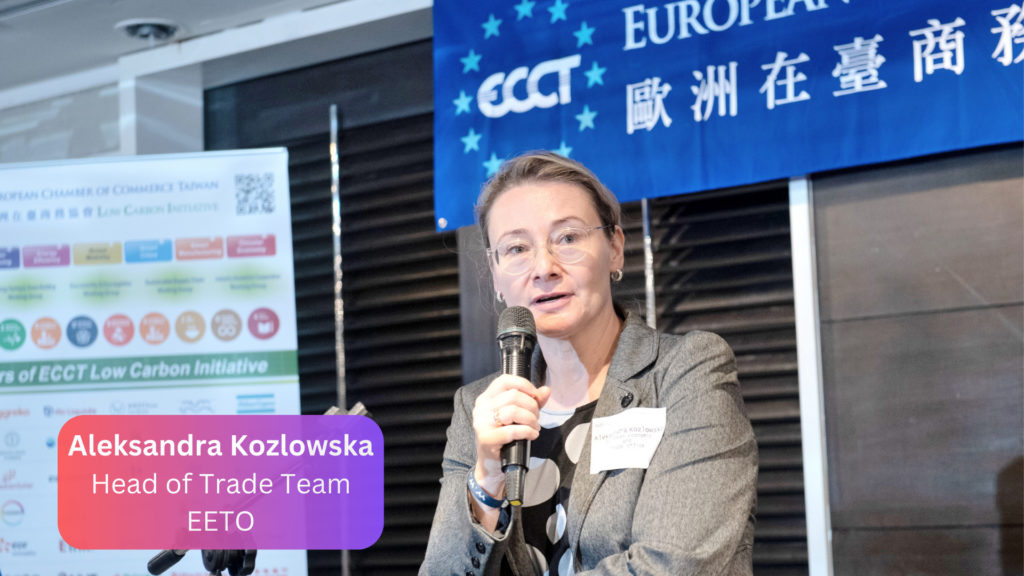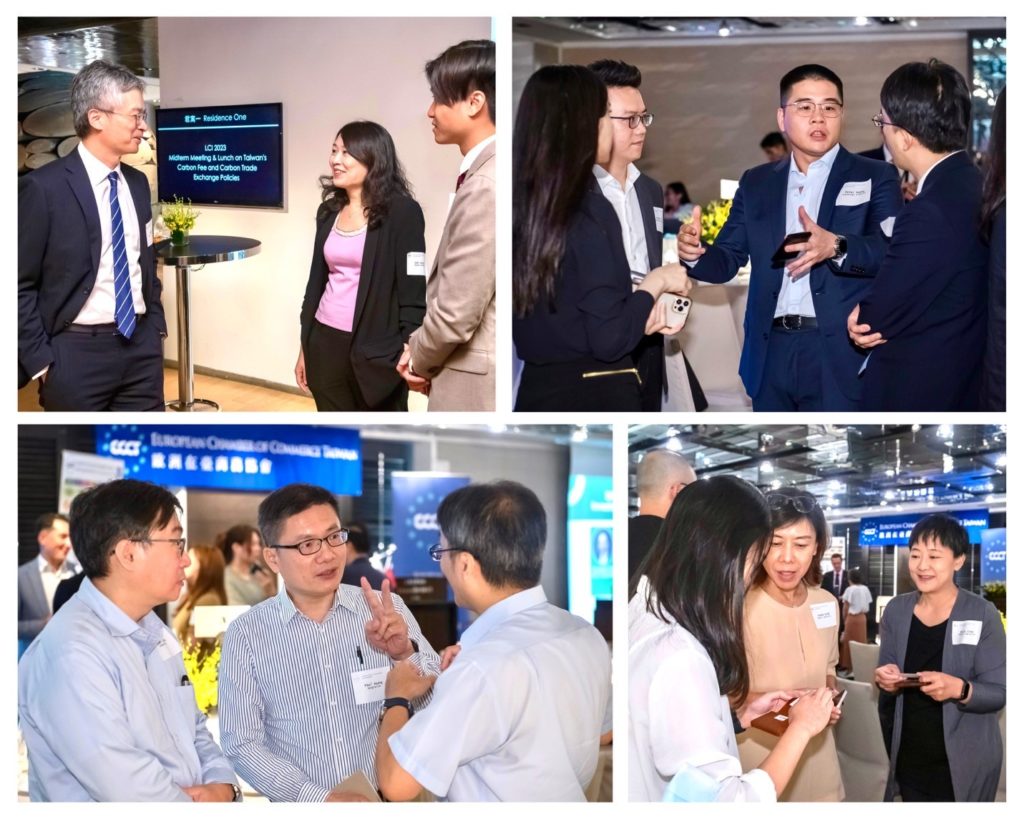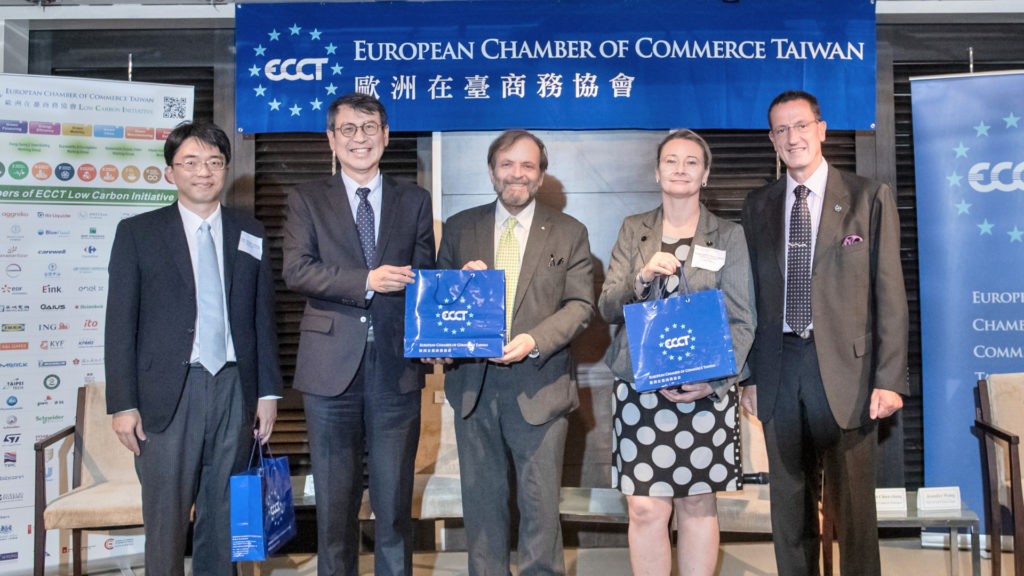[Event Report] LCI 2023 Midterm Meeting & Lunch on Taiwan's Carbon Fee and Carbon Trade Exchange Policies 2023 LCI 年中會員大會暨台灣碳費與碳權交易政策午餐會活動報導
 Jennifer Wang, Vice Chair of ECCT LCI; Dr. Lai Yin-yin, Director General of EPA Waste Management Department; Dr. Lin Tze-luen, Spokesperson and Executive Director of the Executive Yuan's Office of Energy and Carbon Reduction; Sean McDermott, Vice Chair of ECCT LCI; Giuseppe Izzo, Chairman of ECCT; Freddie Höglund, CEO of ECCT; Tien Chien-chung, CEO of the Taiwan Carbon Solution Exchange; Sammy Su, Director of ECCT LCI
Jennifer Wang, Vice Chair of ECCT LCI; Dr. Lai Yin-yin, Director General of EPA Waste Management Department; Dr. Lin Tze-luen, Spokesperson and Executive Director of the Executive Yuan's Office of Energy and Carbon Reduction; Sean McDermott, Vice Chair of ECCT LCI; Giuseppe Izzo, Chairman of ECCT; Freddie Höglund, CEO of ECCT; Tien Chien-chung, CEO of the Taiwan Carbon Solution Exchange; Sammy Su, Director of ECCT LCI
Photo Gallery: Facebook / LinkedIn
Event Review Video: LCI
On 15 Aug. the ECCT Low Carbon Initiative (LCI) held its 2023 Midterm Meeting, introducing 9 new members for the first half-year of 2023, and presenting the LCI Structure & Membership Update, Q3-Q4 Roadmap, and Q1-Q2 Event Review. Over 80 LCI members participated in the LCI Midterm Meeting.
 Giuseppe Izzo, Chairman of ECCT, giving the opening remarks
Giuseppe Izzo, Chairman of ECCT, giving the opening remarks
 Freddie Höglund, CEO of ECCT
Freddie Höglund, CEO of ECCT
Following the midterm meeting, the ECCT's Low Carbon Initiative (LCI) arranged a lunch event on the topic of Taiwan's carbon trade policies. The event featured presentations by Tien Chien-chung, CEO of the Taiwan Carbon Solution Exchange (TCSE, 臺灣碳權交易所總經理田建中); Dr. Lin Tze-luen, Spokesperson and Executive Director of the Executive Yuan's Office of Energy and Carbon Reduction (行政院發言人暨行政院能源及減碳辦公室執行長 林子倫博士) and Aleksandra Kozlowska, Head of Trade Section for the European Economic and Trade Office (EETO, 歐洲經貿辦事處經貿組組長楊藹羚).
 Tien Chien-chung, CEO of the Taiwan Carbon Solution Exchange
Tien Chien-chung, CEO of the Taiwan Carbon Solution Exchange
In his presentation, Tien Chien-chung shared TCSE's roadmap and how its carbon credit exchange system will be synchronized with Taiwan's carbon fee mechanism.
Starting in 2024, companies listed in Taiwan with paid-in capital of US$10 billion or more will be subject to greenhouse gas emission disclosure requirements. Starting in 2025, this will be extended to companies with paid-in capital of US$5 billion or more. Only disclosures of scope 1 (direct emissions from sources on site) and scope 2 (indirect emissions from energy/utilities) will be required initially, although there is now an international trend to include scope 3 (indirect emissions from the supply chain). The speaker cited the example of Microsoft, for which scope 3 emissions account for almost 97% of its total emissions.
Manufacturers like HP have set paths to net zero that will have a considerable impact on their suppliers, which is causing “carbon anxiety” for suppliers, many of which are Taiwanese. Others are actively working to reduce their emissions from the production process. Adidas, for example, has produced the world's lowest carbon shoe to date by using low carbon materials and energy efficient processes both for the manufacturing and distribution of the shoes. Taiwan manufacturer ASUS plans to reduce the carbon footprint of its notebook computers to 220kgs per unit. The company has also introduced its “carbon partner services” to help upstream suppliers to reduce their carbon footprints, thereby turning the drive to decarbonise into a business opportunity.
One of the aims of the TCSE is to facilitate price discovery of carbon rights trading, incentivise companies to reduce greenhouse gas emissions and cultivate low-carbon technology innovation and new industries. It will also offer carbon consulting and education services, including holding courses all across Taiwan.
 Dr. Lin Tze-luen, Spokesperson and Executive Director of the Executive Yuan's Office of Energy and Carbon Reduction
Dr. Lin Tze-luen, Spokesperson and Executive Director of the Executive Yuan's Office of Energy and Carbon Reduction
In his presentation, Dr Lin Tze-luen gave a policy update on Taiwan's carbon fee collection scheme. The Climate Change Response Act provides a legal basis for Taiwan's path to net zero emissions but there are around 20 laws and regulations that will be amended or introduced to enable the transition.
Taiwan's EPA has announced that starting from the second half of 2024, Taiwan will begin collecting carbon fees from local companies. The initial targets will be companies which are responsible for 25,000 tonnes or more of emissions (through manufacturing activities or electricity use). There will be many incentives in place to encourage companies to reduce emissions.
Funds will be used to implement greenhouse gas reduction, promote climate change adaptation, carbon footprint management mechanisms, education, grants, research and development, among others.
Many countries are adopting voluntary reduction mechanisms. According to the World Bank 2023 report, the voluntary reduction (carbon credit) market will slow down in 2022, and the independent carbon credit mechanism will issue 275 million tonnes of credit, but more and more countries are considering establishing domestic credit mechanisms. According to the speaker, in Taiwan, 92 cases of carbon reduction projects have been registered, including boiler replacement and biogas collection in livestock farms.
Enterprises or governments at all levels may propose voluntary reduction projects according to this method and apply to the EPA for reduction quotas. Taking carbon sinks as an example, in addition to the original afforestation, the Ministry of Agriculture is currently developing methodologies for forest management and bamboo forests.
 Aleksandra Kozlowska, Head of Trade Section for the European Economic and Trade Office
Aleksandra Kozlowska, Head of Trade Section for the European Economic and Trade Office
The topic of Aleksandra Kozlowska's presentation was “CBAM: A new, green way of pricing carbon in imports to the EU”. As part of the European Green Deal, the CBAM addresses the increased risk of carbon leakage to ensure the effectiveness of EU climate policy and contribute to global decarbonisation.
There are four key elements of the CBAM design: 1) To mirror EU carbon pricing through a new mechanism for imports into the EU; 2) To comply with WTO and be fully in line with international trade rules; 3) It targets companies, not countries, based on the actual carbon content of imported goods and 4) It focuses on carbon intensive sectors (not every industry sector is covered).
Under the CBAM, EU businesses pay a carbon price on their production in the EU. Imports will need to pay a carbon adjustment, corresponding to the price they would have paid if the goods had been produced under the EU's carbon pricing rules (ETS). The CBAM charge will be adjusted to reflect the level of EU ETS free allowances (which will be phased out starting in October 2023) allocated to EU production of sectors in scope. There will be no double pricing. If a non-EU producer can show that they have already paid a carbon price for the production of the imported goods in a third country, that amount can be deducted for the EU importer.
Taiwan's steel sector will be the most affected by CBAM since a relatively high portion of Taiwan's steel exports go to the EU. This will also apply to downstream metal products, such as bolts and nuts.
The next two years will be a transition period before fees are actually levied. In 2025 the European Commission will present two reports before the end of the transitional period. The first will contain an assessment on the possibility to extend the scope, criteria to be used to identify the goods to be included in Annex I of the CBAM regulation, technical requirements for calculating embedded emissions for newly added goods as well as the governance system, including the administrative costs and methodology for the calculation of indirect emissions, among other items. The second report will identify products that are further down the value chain of the goods listed in Annex I.
Companies have to report emissions, including embedded emissions of materials used. However, since this may sometimes be difficult to calculate accurately, especially for small producers of downstream products, best estimates will be acceptable based on the best available knowledge.
The EU's Directorate-General for Taxation and Customs Union (DG TAXUD), the DG responsible for CBAM, is finalising a priority outreach economies list, which may include Taiwan (although this is not yet confirmed). The final CBAM implementing regulation and technical guidelines will be published soon. Importers will be invited to attend information sessions for compliance, which are expected to kick off in September 2023.

 ECCT and LCI members mingling and chatting during the luncheon
ECCT and LCI members mingling and chatting during the luncheon
 ECCT Chairman Giuseppe Izzo and ECCT CEO Freddie Höglund presenting gifts to the three honorable speakers
ECCT Chairman Giuseppe Izzo and ECCT CEO Freddie Höglund presenting gifts to the three honorable speakers
